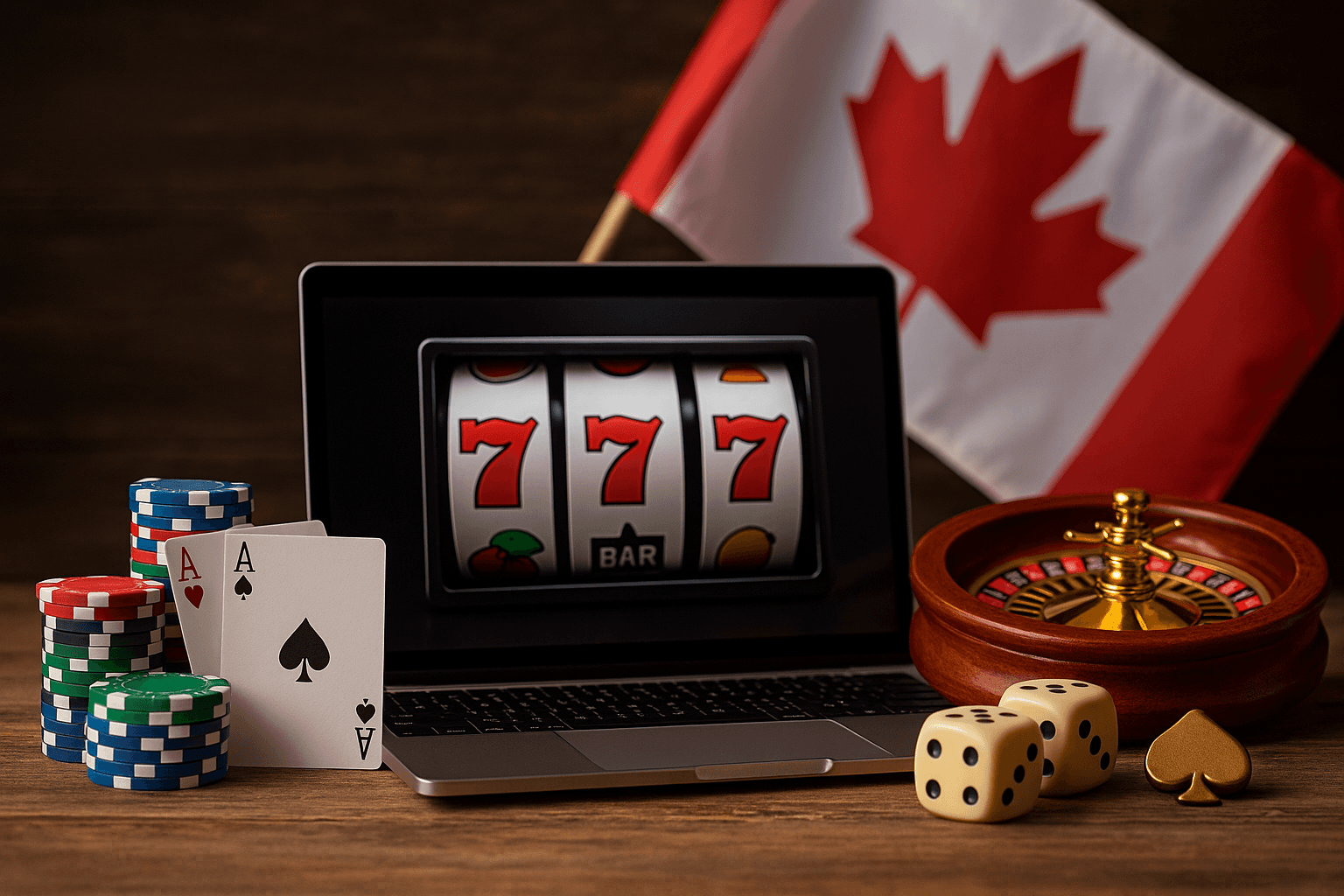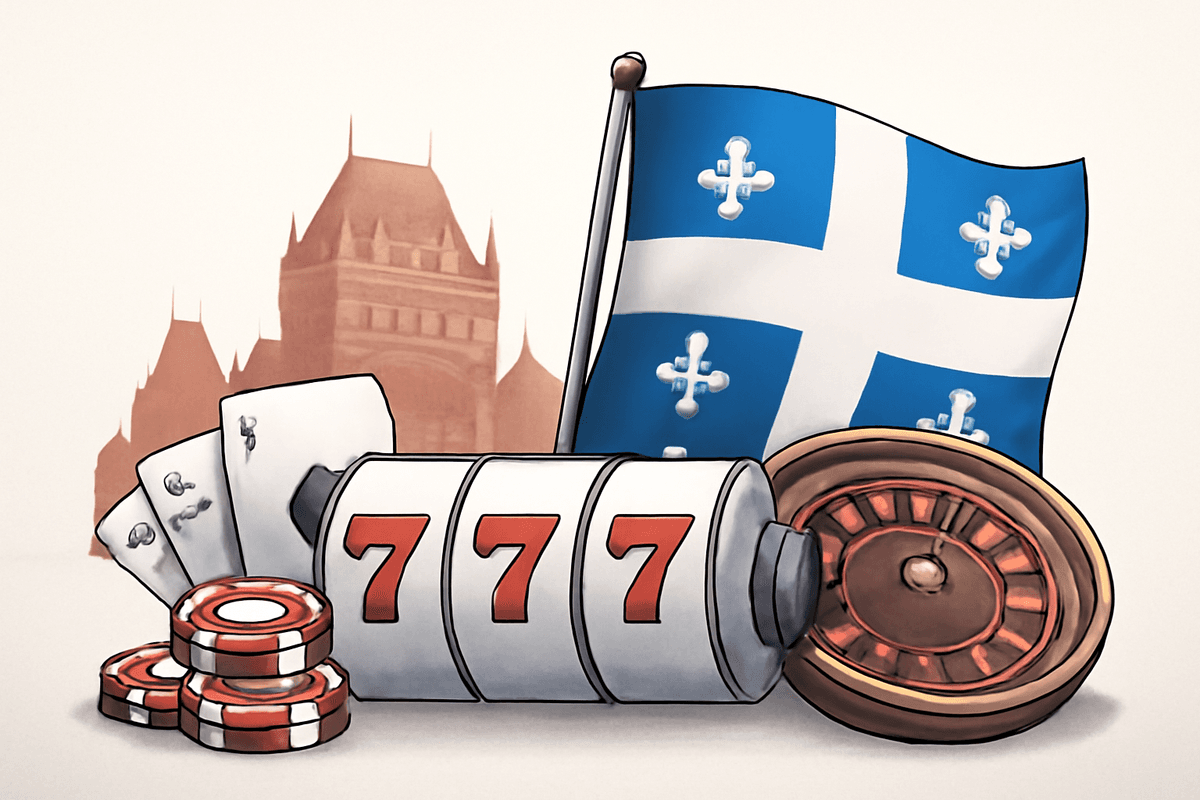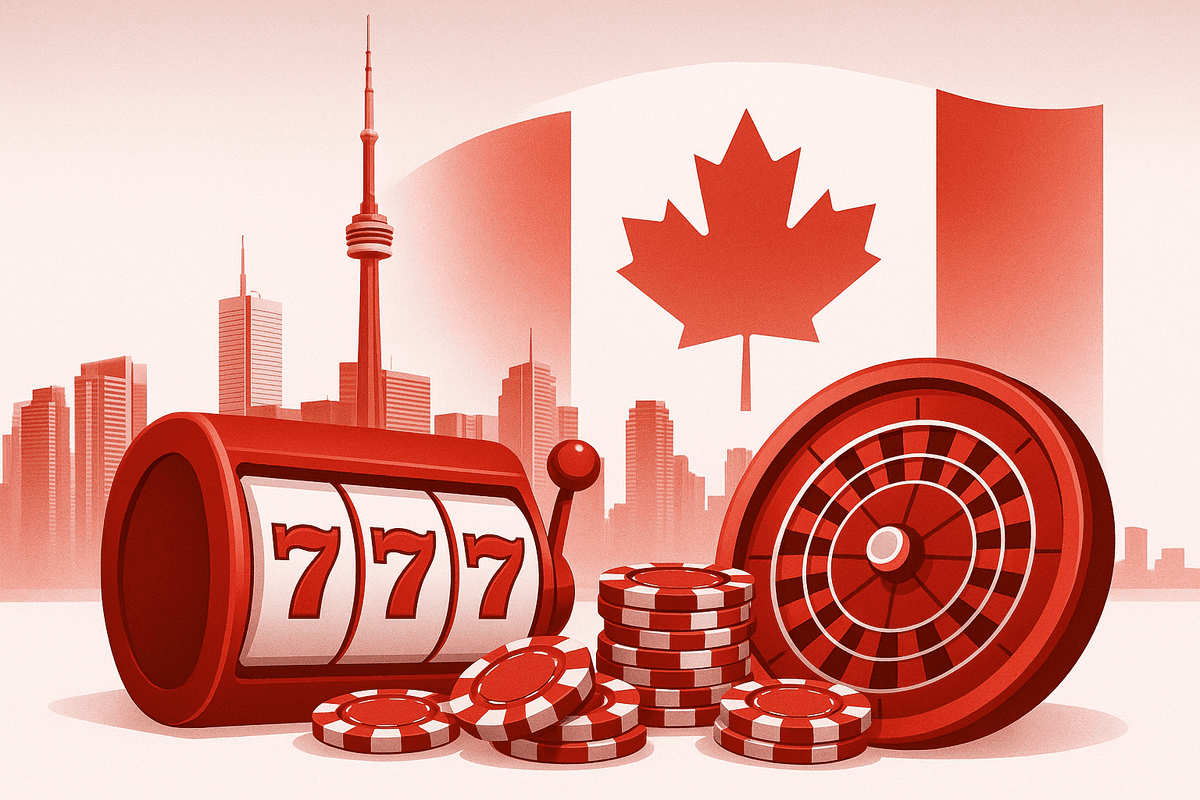Online Gambling in Canada - Licensed Casinos & Slots
📊 Canada at a Glance
• Market size: $15.6B (2025)
• Open markets: Ontario, Alberta (2026)
• Tax on winnings: 0%
• Popular payment: Interac
• Support: ConnexOntario — 1-866-531-2600
Online gambling in Canada has evolved more rapidly than most people realize. What used to be a grey zone of offshore websites is now a regulated industry, with licensed casinos and slots you can actually trust. For players, that means more choice, stronger protections, and better mobile-first platforms.
Behind the scenes, the numbers are huge. In 2025, Canada's gambling market is worth $15.6 billion, making it the fourth-largest in the world. The turning point came in 2022, when Ontario opened a legal, competitive market — now home to over 50 licensed operators and generating more than $3.2 billion in revenue annually, with a 32% annual growth rate. Quebec runs its own established government platform, while Alberta, BC, and Manitoba are lining up to follow Ontario's model.
Industry analysts expect the market to reach $17.5 billion by 2029, driven by provincial regulation, technological innovation, and the fact that six in ten Canadians gamble in some form, with most of them doing so on mobile — and the shift is just beginning.

Canada’s online gambling landscape — where modern regulation meets trusted casinos, local payment methods, and a player-first experience.
where do you want to play?
How Online Gambling Works in Canada
Canada's approach to online gambling is, well, uniquely Canadian. The Criminal Code technically makes all gambling illegal — slots, poker, sports betting, the works. But Part VII immediately flips the script, carving out exceptions that dump responsibility onto the provinces. Each one gets to build their own system from scratch.
💡 The Split: Federal law says what's banned. Provinces decide what's allowed.
“In Canada, Ottawa writes the rulebook — but the provinces run the teams. That’s why Ontario and Quebec can follow the same federal law yet build completely different gambling systems.”
Picture hockey, because of course. Ottawa writes the basic rules, but every province coaches its own franchise. Section 207 gives provinces the power to "conduct and manage" gambling — that's the legal phrase allowing Ontario to build a competitive league with 50+ operators, Quebec to run the whole operation through a government platform, and Alberta to gear up for something similar. Same federal framework, wildly different execution.
The split between federal and provincial matters is more than you'd guess:
- Physical casinos: Operated provincially under federal framework
- Online casinos, sportsbooks, poker rooms: 100% provincial turf
- Single-event sports betting: Legalized federally via Bill C-218 (2021), but provinces control implementation
You can't wake up tomorrow and launch a gambling site here — you need a province to bless it first.
Worth mentioning: the Kahnawake Gaming Commission, operating from Mohawk Territory outside Montreal. They've been in the licensing business since 1996, working under Indigenous sovereignty laws, and now oversee 250+ gambling operators worldwide — legitimately one of the longest-running regulators out there.
The complication? Those licenses don't satisfy provincial requirements for Canadian players. Kahnawake carries weight in the global industry, no question, but from a provincial perspective, it's still a grey market.
Offshore gambling sites operate in a legal grey zone. Here's how it works:
For operators: It's illegal for unlicensed sites to offer gambling services to Canadians. Canadian law explicitly prohibits this.
For players: There's no law against Canadians using offshore sites. To date, no Canadian player has been prosecuted for gambling on an offshore platform.
The downside is straightforward. Offshore sites don't follow Canadian regulations, which means:
- No Canadian consumer protection laws apply
- No access to provincial dispute resolution processes
- No mandatory responsible gambling requirements
- No recourse if the site refuses payouts or disappears
You can legally access these sites as a player, but you're doing so without the safety measures that licensed operators are required to provide.
Which Canadian Provinces Allow Online Gambling?
"Think of Canada's gambling map as 10 different experiments running at once: Ontario went full free market, Quebec built their own fortress, and Alberta's about to join the party."
Canada's online gambling landscape is anything but unified. Each province charts its own course, ranging from wide-open competition to tightly controlled monopolies.
Canada's provincial gambling landscape splits into three distinct camps. Ontario represents the new guard — an open, competitive market where 50+ private operators duke it out alongside the government-run platform. It's the model everyone's watching. Quebec took the opposite route, building EspaceJeux as a state-run monopoly that's been operating since 2010. Only the provincial government can legally offer online gambling here — no private licenses available, no room for competitors. Players can access EspaceJeux or turn to offshore sites, but there's no open market.
The middle ground belongs to provinces like British Columbia, Manitoba, and Saskatchewan, which also run state monopolies through crown corporation sites like PlayNow. "State-run" means the provincial government owns and operates the entire platform — they're the house, the regulator, and the only legal option rolled into one. Players can bet legally, but only on these government platforms. Affiliates can promote these sites or offshore alternatives, but forget about licensing a private operation. These provinces are facing mounting pressure from operators and players alike to open up, especially as Ontario's numbers keep climbing.
Alberta's the one to watch in 2026. The province passed Bill 48 in March 2025, creating the Alberta iGaming Corporation and essentially copying Ontario's homework — Minister Dale Nally said as much publicly. Early 2026 is the target for launch, which would make Alberta the second Canadian province with a fully competitive market. British Columbia might follow eventually, though operators have been lobbying for years without much traction. The rest of Canada? Still sitting in that grey zone where players can access offshore sites without legal consequence, but the provincial lottery corporations aren't exactly thrilled about it.
The trend is clear: Ontario proved the open model works financially and for player protection. Alberta bought in. The question now is how long the monopoly provinces can hold out before the economics — and the players — force their hand.
What Makes Canada Unique in Online Gambling
Canadian online gambling has its own set of quirks you won't find elsewhere. From payments to winnings, here's what really sets Canada apart.
Payment Methods — Why Interac Dominates
If you play online in Canada, you'll notice fast that Interac e-Transfer is everywhere. It's instant, secure, and trusted — basically the lifeline of Canadian gambling sites.
Alongside Interac you'll find a couple of other Canada-specific options like Instadebit and iDebit, both built for direct bank transfers. Credit cards, on the other hand, are hit-or-miss. Some banks allow gambling transactions, many block them outright.
Currency Matters
Licensed Canadian sites always operate in CAD. That's not just a cosmetic detail — it saves you money and headaches.
- No conversion fees
- No hidden exchange-rate losses
- No surprises when withdrawing your winnings
Play in Canadian dollars and you know exactly what you're risking and what you're cashing out.
Legal Age Differences
Canada doesn't have a single national gambling age. Most provinces set the bar at 19+, but in Alberta, Manitoba, and Quebec the minimum is 18. Licensed operators enforce this strictly with ID checks — try to sign up underage and you'll hit a wall.
Tax-Free Winnings
Here's where Canadian players get a real advantage: your winnings are tax-free. Whether it's a small spin payout or a jackpot, the Canada Revenue Agency doesn't treat casual gambling as taxable income.
That means no forms, no reporting, and no deductions. In the U.S. you'd pay tax on every win; in Canada, you keep what you earn.
⚠️ Only exception: If gambling is your main business or primary income source, the CRA could see things differently. But for nearly everyone, winnings are yours, clean and clear.
Bottom Line
- Interac is the gold standard for deposits and withdrawals
- CAD-native play means no lost money on fees
- Check your province's age rules before signing up
- And yes — your winnings stay tax-free
Gambling Safely in Canada
Canada takes responsible gambling seriously. Every licensed operator is required to provide player protection tools, and there's a nationwide network of support services available if you need help.
📊 The Reality: Around 60% of Canadians gamble in some form, and about 2% experience problem gambling. That's roughly 760,000 Canadians — not a small number. The good news? Help is available, free, and confidential.
National Support Organizations
Responsible Gambling Council (RGC) is Canada's leading independent organization focused on problem gambling prevention. They work with operators and regulators to set standards, provide education, and develop tools like the RG Check accreditation program. If you're looking for resources or want to understand safer gambling practices, RGC is the place to start.
Getting Help — Province by Province
Each province runs its own support services:
- Ontario: ConnexOntario — 1-866-531-2600 (24/7, 170 languages)
- British Columbia: Gambling Support BC — 1-888-795-6111
- Alberta: Addiction Helpline — Available 24/7
- Quebec: Gambling: Help and Referral — 1-800-461-0140
- Other provinces: Check the Responsible Gambling Council website for local helplines
All helplines are free, confidential, and available in multiple languages. They can connect you with local counsellors, book appointments, and provide immediate support.
Self-Exclusion Programs
Every licensed gambling site in Canada offers self-exclusion. This lets you voluntarily block yourself from accessing gambling platforms for a set period — anywhere from a few months to permanently. In Ontario, there's even a centralized system that blocks you across all licensed operators at once.
These programs work. Once you're enrolled, the site cannot legally let you back in until the exclusion period ends.
🆘 Need Help Right Now?
ConnexOntario (Ontario): 1-866-531-2600
National Crisis Line: Talk to someone 24/7
GamTalk: Free online chat support at gamtalk.org
RecoverMe App: Free mobile app using cognitive behavioural therapy — use code RECOVERME100
Gambling should be entertainment, not a way to make money or escape problems. If it's feeling like more than that, reach out. These services exist because people use them — and they work.
FAQ
Yes, but regulation is provincial. Ontario has an open market, Quebec runs a monopoly, and other provinces vary.
The Criminal Code bans gambling but lets provinces regulate it. Online gambling is 100% provincial.
Ontario (open market), Quebec, BC, Manitoba, Saskatchewan (monopolies). Alberta launches in 2026. Others = offshore only.
No. Winnings are tax-free for 99% of players. Only professional gamblers may owe tax.
Most provinces set 19+. Alberta, Manitoba, and Quebec allow 18+. Enforced with ID verification.
It's fast, secure, and Canada-only. Almost every licensed site supports Interac — players expect it.
Sources & References
- Department of Justice Canada — Criminal Code (Part VII: Gaming & Betting)
- Alcohol and Gaming Commission of Ontario (AGCO) — Regulatory Authority
- Statistics Canada — Gambling in Canada (Participation & Trends)
- Canadian Centre on Substance Use and Addiction (CCSA) — Gambling Resources
Notes: Provincial frameworks operate under the federal Criminal Code exemptions; program details and policies are maintained by each province.
⚠️ Disclaimer: The information on this page is provided for general reference only. Gambling regulations in Canada are subject to change, and while we update this page regularly, occasional inaccuracies may occur due to evolving laws or provincial policy updates.

